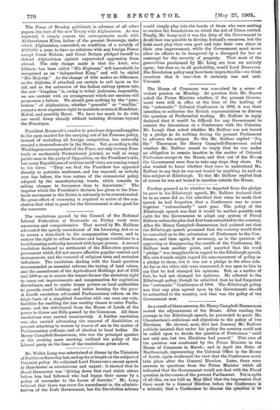Further pressed as to whether he departed from the pledge
he gave in his Edinburgh speech, Mr. Balfour declared that he in no sense did so, but admitted that when he made that speech he had forgotten that a Conference was to come together " automatically " next year. The policy of the Edinburgh speech was that it would be neither possible nor right for the Government to adopt any system of Fiscal Reform unless the plan had first been submitted to the country. After Sir Henry Campbell-Bannerman had pointed out that the Edinburgh speech promised that the country would first be consulted as to the submission of Preference to the Con- ference, and then again, if necessary, as to the question of approving or disapproving the results of the Conference, Mr. Balfour took another point, and asserted that the word " pledge " was inapplicable in regard to the Edinburgh speech. His own friends might regard his announcement of policy as a pledge to them, but it was not a pledge to the other side. As far as the other side were concerned, it was open to him to say that he had changed his opinions. But, as a matter of fact, he had not changed his opinions. He adhered to the Edinburgh policy, though he admitted that he had forgotten the " automatic " Conference of 1906. The Edinburgh policy was that any plan agreed upon by the Government should be submitted to the country, and that was the policy of the Government now.






































 Previous page
Previous page